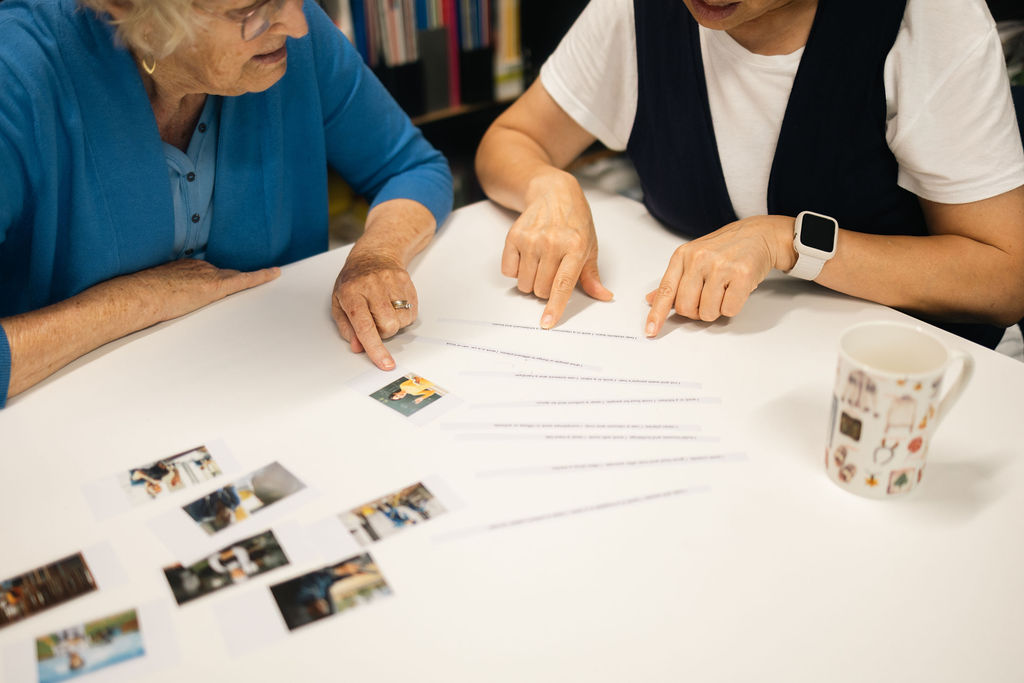Dianne Wilson taught Gilda, for three months before they met in person – thanks to Skype.
Gilda (Guo Du Song), from Blenheim, whose first language is Mandarin, was eager to improve her conversational English, but when a home tutor became available she was about to visit family in China. Keen not to miss the opportunity, Gilda’s daughter suggested she could begin learning with Dianne via Skype, the free software application that allows users to make voice calls over the internet and talk and see one another ‘live’ via their computer screens.
Dianne was happy to try, and the project has proved a great success. Now the option of Skype lessons has been opened up to many other tutors and learners in Blenheim. Tracey Ellis, English Language Partners’ Coordinator for Blenheim, says Skype provides a valuable additional tool and teaching method that gives tutors the option of working with more rural learners. It could also ensure lesson continuity if learners go home for long trips.
“Gilda had been on the waiting list for a while when Dianne kindly offered to take another learner,” says Tracey. “Gilda felt quite isolated and was keen to improve her conversational English so she could meet more people. But when we rang her daughter we found that Gilda was about to go to China for three months and was concerned that she might miss the opportunity.
“They asked whether Dianne would be willing to teach Gilda via Skype, if they could get Skype set up for Gilda in China and make all the calls. We had never done that before but I asked Dianne and she was happy to give it a try.”
Dianne, who has been a tutor for three years, already had Skype installed at home and knew what an effective teaching tool video conferencing can be. As a history teacher for the Westmount School, which has 15 campuses across New Zealand, she delivers most of her lessons in this way.
“We tossed around ideas about how we could do it and away we went,” says Dianne.
“Gilda is highly educated and very well read. She reads complex novels in English but wanted to build her confidence with conversational English.”
For three months Dianne and Gilda had once-weekly Skype sessions of about 90 minutes. Dianne would also email worksheets to Gilda who would complete and email them back so Dianne could check and correct them for her.
“We are the same age and it was rather like having a pen pal,” says Dianne. “During our lessons we would have very interesting conversations about life in China from fruit trees, gardening and jewellery, to the music and food of different ethnic groups.
“We would just play it by ear and go where the conversation took us. Gilda told me that she would also read my emails out loud to practice her pronunciation and I would tailor worksheets to her needs.
“It has been very good for Gilda and I. When we met in person it was like two old friends meeting and we chatted for a couple of hours. In many respects it broke down the barrier between teacher and learner because we began by just chatting for a couple of months and getting to know each other.”
Gilda, who returned to Blenheim at the beginning of November, and is now having more traditional one-to-one lessons with Dianne, says that she feels more confident speaking now. “I can speak more naturally in simple sentences and I can start conversations with people. On the journey back I spoke to people on the plane,” she says. “For a long time I wanted to speak English with other people, but I didn’t know how to open my mouth.
“Thank you Dianne and Tracey and English Language Partners for doing all these things for me. Via your effort I dare to speak to other people, although when I am speaking my brain is tense. I am so happy I do open my mouth. You do a great job.”
Tracey says that, while face-to-face teaching remained the ideal approach, Skype opened up exciting new options.
“Volunteer tutors who don’t have Skype at home have the option of teaching learners via Skype from the centre. It means we have the opportunity to respond to people’s needs in a different way, which is what we are all about.
“Skype offers potential to work with people in more isolated rural areas where it might not be easy to get together with a tutor. It also gives us a whole new range of options for group-based delivery.”
Tracey says that when learners go to their home countries for long visits they often don’t have anyone to speak English with and their language skills slip.
“We recently had a Brazilian learner who had worked very hard and made fantastic progress and then went home for three months to show her beautiful baby to her family,” said Tracey.
“When she came back she was quite upset at how much she had slipped. Skype lessons could also provide a way of ensuring the learner maintains their fluency and continues to progress.”
Writer: Patricia Thompson











.png)






